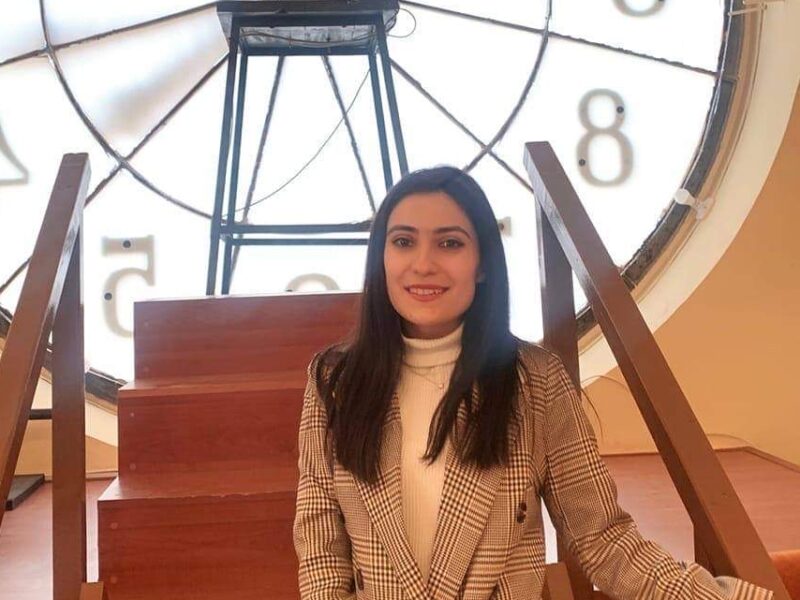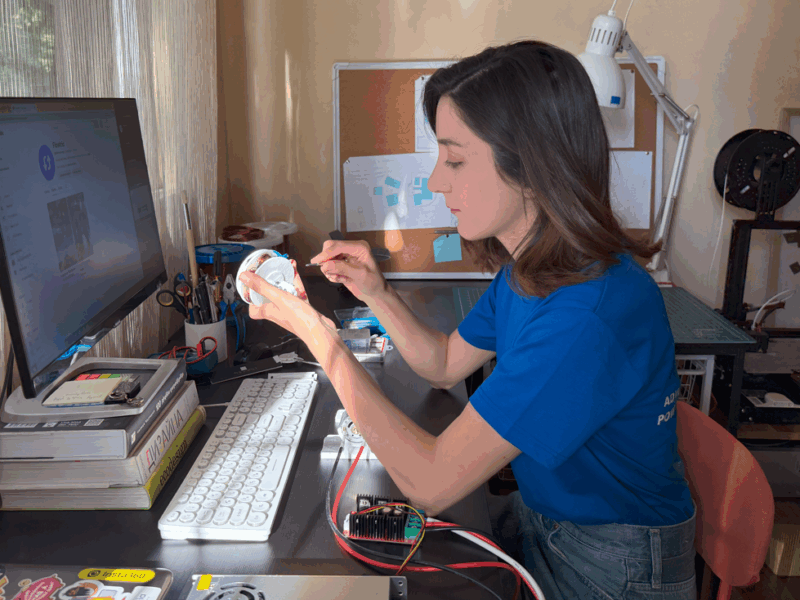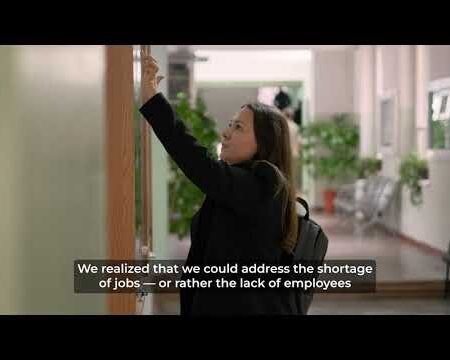
Unlocking Potential: The Role of Women in Armenia’s Entrepreneurial Landscape

Armenia’s entrepreneurial ecosystem is steadily growing, encompassing a wide range of sectors such as agriculture, tourism, creative industries, and, most notably, technology. With a supportive mix of government initiatives, international funding, and innovation hubs, the country is creating fertile ground for new ventures. However, women remain significantly underrepresented in entrepreneurship across these sectors, limiting the ecosystem’s full potential for innovation and inclusive growth.
Gender gap in entrepreneurship
Women entrepreneurs bring unique perspectives and approaches, often driving ventures that prioritize social impact and green technology, contributing significantly to the achievement of the UN Sustainable Development Goals (SDGs). Their inclusion is vital – not just for achieving gender equity, but for fostering economic resilience and long-term development. These ventures are not just profitable but also pivotal in addressing global challenges, from climate change to treating cancer. While challenges such as access to funding, entrenched gender norms, and limited mentorship networks persist, sectors like technology present promising opportunities.
In Armenia, the tech industry is emerging as a key driver of innovation with initiatives such as the TUMO Center for Creative Technologies and Enterprise Incubator Foundation. Women comprise 40% of the workforce in Armenia’s technology sector, surpassing the average in many developed countries, including 35% in the U.S. However, this representation is uneven: women are predominantly found in non-technical roles such as HR, talent acquisition, and legal, while men continue to dominate technical fields like software development, engineering, and DevOps. This is critical because women’s lagging participation in employment and entrepreneurship represents a misallocation of Armenia’s human resource potential, resulting in an estimated loss of economic output that is equivalent to 14 percent of GDP.
Overall, the underrepresentation of women in STEM (science, technology, engineering, and mathematics) is a global challenge, with far-reaching implications for innovation, economic growth, and social equity. Despite clear evidence that gender diversity boosts business performance, women founders in STEM receive less than 2 percent of global venture capital funding. Despite that global data reveal that startups with women founders generate higher revenue per dollar invested than their male-led counterparts. Traditional financial institutions often hesitate to lend to women-led businesses, and women entrepreneurs frequently lack the necessary collateral for substantial loans. Moreover, studies show that women entrepreneurs in Armenia rely more on bank loans than equity investment. Additionally, there is a scarcity of venture capital and angel investments specifically targeted at women. An important observation is the lack of representation of women in the venture capital firms themselves, potentially perpetuating a bias against all women-led startups.
The power of persistence: a story of Naira Paronikyan
According to Naira Paronikyan, an entrepreneur and management consultant from Armenia, leading startup ventures in HealthTech, CleanTech, and Waste Management since 2018, her entrepreneurial journey has been shaped by challenges and obstacles as well. Though each of them served as a lesson that fueled her success in Biotech startup focused on diagnostic technology.

As a young woman entrepreneur, she has encountered skepticism about her leadership and expertise. Although rather than seeking validation, she has chosen to work with professionals who foster growth and innovation in a free-from-stereotypes way.
“Another major challenge in the startup ecosystem is the hesitation of investors and stakeholders to back deep-tech ventures due to their complexity and high risk. Instead of compromising, we focus on finding investors who truly understand our vision and can support our market entry,” explains Naira. As an inspiring example to other women entrepreneurs, her shared wisdom is to build resilience to failure, even though entrepreneurship is an uphill battle, success means solving real-world problems that impact countless lives.
A call for systemic change
Despite the structural barriers women face in STEM and venture capital, targeted support cannot wait. While the system is being reshaped, we must act in parallel – equipping women today to navigate and succeed within it, even as we work toward broader change. This begins with capacity building: strengthening skills, knowledge, networks, and confidence to help women overcome entry barriers and lead with impact.
At the same time, to close persistent funding gaps, we need dedicated financial instruments – such as micro-grants and gender-responsive investment criteria within VC firms. Expanding mentorship ecosystems and fostering cross-sector collaboration with governments and NGOs can help accelerate the shift toward more inclusive investment strategies.
Apparently, all the actors have a role to play and the time to act is now!
Investing in empowering and scaling up women-led ventures isn’t just about generating financial returns – it’s about shaping a more equitable and innovative future. Recognizing this, RECONOMY, a regional green and inclusive economic development program implemented by Helvetas and financed by Sweden, works to strengthen collaboration between key ecosystem players and promote inclusive entrepreneurship in Armenia.
In this context, FAST is launching a WIN4Education, supported by the RECONOMY program in partnership with Teach For Armenia and the Georgian Institute of Public Affairs (GIPA).
The initiative is expanding regionally to connect Armenia and Georgia around a shared goal to empower women and youth – especially in rural areas – to lead transformation in STEM education and unlock their entrepreneurial potential.
Business Her Way: a testimony of Ani Sahakyan, one of the previous cohort graduates:
My idea was simple – create a small device that could generate power from water flow. Later, I realized it could also work with wind and even sunlight. That’s how Flowtric became a compact, modular device that creates clean energy from nature. It’s designed for people who live off-grid, go hiking or camping, or just want more energy independence. The main goal of Flowtric is to give people the freedom to access electricity anywhere—without relying on the grid.
The idea for Flowtric came to me like a Eureka moment. But when I shared it for the first time, the reaction was disappointing. I heard comments like, “Are you getting crazy?” or “Instead of thinking about marriage, you’re thinking about motors and generators?” It was hard to hear those things—especially from people close to me. Many didn’t believe I could do more than just design.
With time, things began to change. The people around me saw how serious I was. They saw the progress, the long hours, and the results. Slowly, they began to believe too. That shift—from doubt to support—was one of the hardest, but also one of the most meaningful parts of the journey.
Joining the FAST WIN program one year ago was my first real step into startup life. We learned about business communication, emotional intelligence, idea generation, and more. Every topic was new and exciting for me.
Flowtric is now in the prototyping stage. A few versions of the device have already been made and tested. Some good results have been reached—like making the design smaller and improving how it works. Now the project is getting support from different programs. One of the key parts of this success was participating in the WIN program too. It gave me important soft skills—like how to apply for funding, what investors are looking for in a startup, how to prepare a pitch, and how to clearly show the value of the product. Without gaining these skills, it would have been very difficult to get support from any funding programs. For me, WIN helped build the foundation of everything that came after.

Empowering women through entrepreneurship is key to building a resilient and inclusive economic future for Armenia. By fostering an enabling entrepreneurial ecosystem – through access to capital, mentorship, policy support, and inclusive networks – we can unlock untapped potential and drive sustainable growth. Now is the time for inclusive investment in the ideas, leadership, and innovation of Armenia.
For more information and registration by August 10, please follow the link here.









Comments (0)